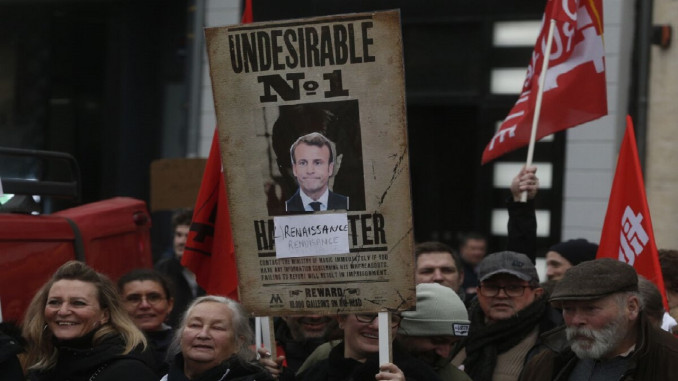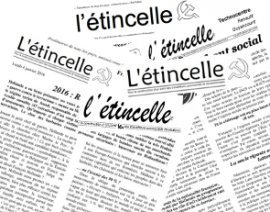
The following is a translation of a perspective written by the Etincelle tendency of the New Anticapitalist Party for discussion with comrades in France organized around Philippe Poutou and Olivier Besancenot.
Since its beginnings in January, the movement against the pension reform has had a political character that goes far beyond the postponement of the legal age of retirement. The use of article 49.3 last week to bypass a vote in the parliament has given an extra boost to the working population and to the youth in this struggle. The ferocious police repression, with its share of maimed and disabled activists, exposes a power that, with or without an institutional “democratic” veneer, governs in the service of the employers. The situation allows (and should impose) that revolutionary militants “pose the question of power,” at larger scale than usual, not in terms of institutional reform, but by explaining that behind the Fifth Republic and the personality of its president power is in the hands of the bourgeoisie.
To this state at the service of the bosses and finance, the workers in struggle could oppose the perspective of their own power, and through their strength and greater organization of their class, to become a counter-power that puts its nose in the affairs of the bourgeoisie.
“Let’s get rid of Macron!” Yes, and the Medef too!
Macron is a focal point for working-class anger because he embodies so well the social class whose interests he defends. That’s why we can’t leave things at the very legitimate and widespread desire to “get rid of him.” To replace him with whom or what? The last legislative elections showed that the “anything but Macron” favored the Rassemblement Nationale, LePen’s party, as long as the alternative remained locked in the ballot box. In a period of movement like the one we are living in, workers and young people are experiencing that their numbers, their own activity – foremost among which is the strike – can exert significant pressure on power. The stuttering and tension of the relative Macronist majority in Parliament have been an illustration of this for a week. A victory against the pension reform would be a striking demonstration of this, which would open up other possibilities, both in terms of demands (wages, jobs, ban on layoffs) and in terms of political rights, for workers, for immigrants…
This workers’ counter-power has already brought back the idea of class struggle, although the focus on Macron obscures things a bit, and allows the bosses of big corporations, who know very well that they are the direct and indirect beneficiaries of this reform, to pass the buck – thus, the silence from Medef (France’s major business owners’ association) for two weeks now.
Behind a bourgeois democracy (whose limits are in general inversely proportional to the wealth of the country and to the margin of maneuver that the ruling class can afford) hides the dictatorship of capital. It’s not a question of president or presidentialism: the Fourth Republic, less presidential, more parliamentary, had its own version of the 49.3, then called “special powers,” which a socialist once used, with the support of the French Communist Party, to intensify the colonial war in Algeria for example. Putting an end to Macron “and his world” does not mean changing the small political staff or replastering institutions in the service of the bourgeoisie, but rather opening the perspective of a workers’ government born in the fire of mobilizations.
It is these communist and revolutionary perspectives that we must discuss, and of which we must convince those who participate in the current arm wrestling.
The Myth of a Left Government Faithful to Workers’ Interests
Any search for shortcuts on this path will only lead to dead ends. To claim, as the comrades around Philippe Poutou do, that right now it is urgent, in order to replace Macron, to “bring together as quickly as possible” “all the organizations of the trade union, political and associative left” to discuss the establishment of “a government as faithful to the interests of the workers as Macron’s is to those of the employers[1]“, is a deception. This kind of declaration maintains the illusions in the institutional left without accelerating by one day the practical possibility of the emergence of a workers’ power.
While the comrades around Philippe Poutou want us to believe that it could engage in the battle for a government at the service of the workers, what is this left really proposing to the movement? The French PC, the Greens, La France Insoumise (Mélenchon’s Party) and the SP have jointly put forward a demand for a shared initiative referendum (RIP), a proposal taken up by the national inter-union, which is leading the movement but is itself incapable of offering it any other perspectives than the institutional mechanics of the left. That is to say, a vast deception: a procedure subject to the goodwill of the Chambers, the Constitutional Council and the President, and which takes almost a year and a half if it sees the light of day at all. Not to mention the fact that this left proposes not even a return to retirement at 60, but always 62 and with contributing for 43 years. This referendum is a way to put the brakes on the movement.
In spite of the fact that the militants of a part of this left, in particular of the CP and FI, are among the most active in the strike, and on the picket line, the leadership of these organizations is leading an unambiguous policy toward an institutional dead end. France Insoumise, like the Rassemblement National (RN), is dreaming of a possible dissolution of the Assembly – each hoping to win the election (a game that is more than dangerous for the left, since the RN is waiting in ambush, and has way better chances in elections). If Macron’s recent setbacks were to turn into a rout under the battering of a continuing movement, growing strikes and a youthful struggle, the dissolution of the parliament would certainly be the last resort of a minority government dropped by its own allies. But this is not a positive perspective for the movement, quite the contrary! It was in the name of a dissolution and the legislative elections of June 1968, which were presented as an opportunity to take revenge on De Gaulle’s power, that the left and the unions buried the general strike… and that the right took it up again for 13 years.
Mélenchon’s VIth Republic in the Spotlight?
Perhaps aware of the difficulties of their abstract proposal for a “government faithful to the interests of wage earners” with a left that only dreams of a referendum and a few more deputies (does it still dream of Mélenchon as Prime Minister?), the comrades around Philippe Poutou have resurrected another of Mélenchon’s obsessions: “a Constituent Assembly on the ashes of the Fifth Republic.”[2] The imagination of these comrades does not go beyond the confines of a ballot box. Have they not learned the recent lessons of the 2019 popular uprising in Chile, buried under the sweet promises of a Constituent Assembly that failed even at the simple task of replacing the Pinochet Constitution?
The task of the hour is twofold for revolutionary activists. To allow the movement to take its possibilities to its conclusion by helping the striking workers direct their own struggle through the multiplication of general assemblies, strike committees, inter-professional assemblies and by centralizing these at all levels; and to do this, by involving as widely as possible all the militants of the movement, union members of all unions, of all political organizations, or non-union members. And at the same time, to make our revolutionary perspectives of overthrowing capitalism – a system of exploitation of the very vast class of the proletariat that is in the streets against a Macron-president-of-the-rich – appear on the widest scale. This requires a clear demarcation from the institutional left and pole of regroupment of revolutionaries. For it is in a situation of social struggle like the one today that a new generation of militants can be born and take part in the construction of a revolutionary party of the workers, with a future.
Raphaël Preston
[1] Leaflet of March 16, published on the site Mar. 17 at 10:31
[2] Communiqué of Mar. 21 published at 1:26 pm




